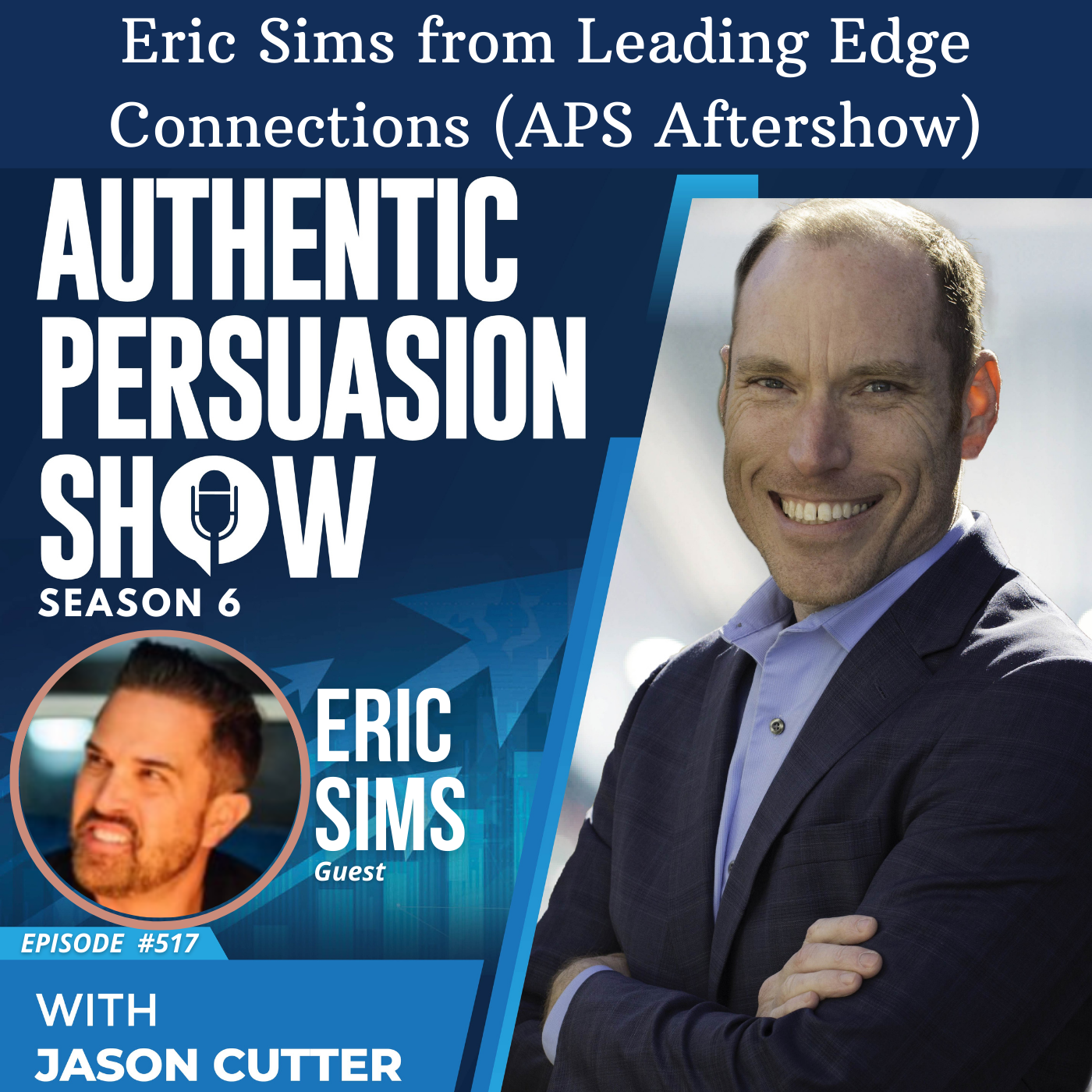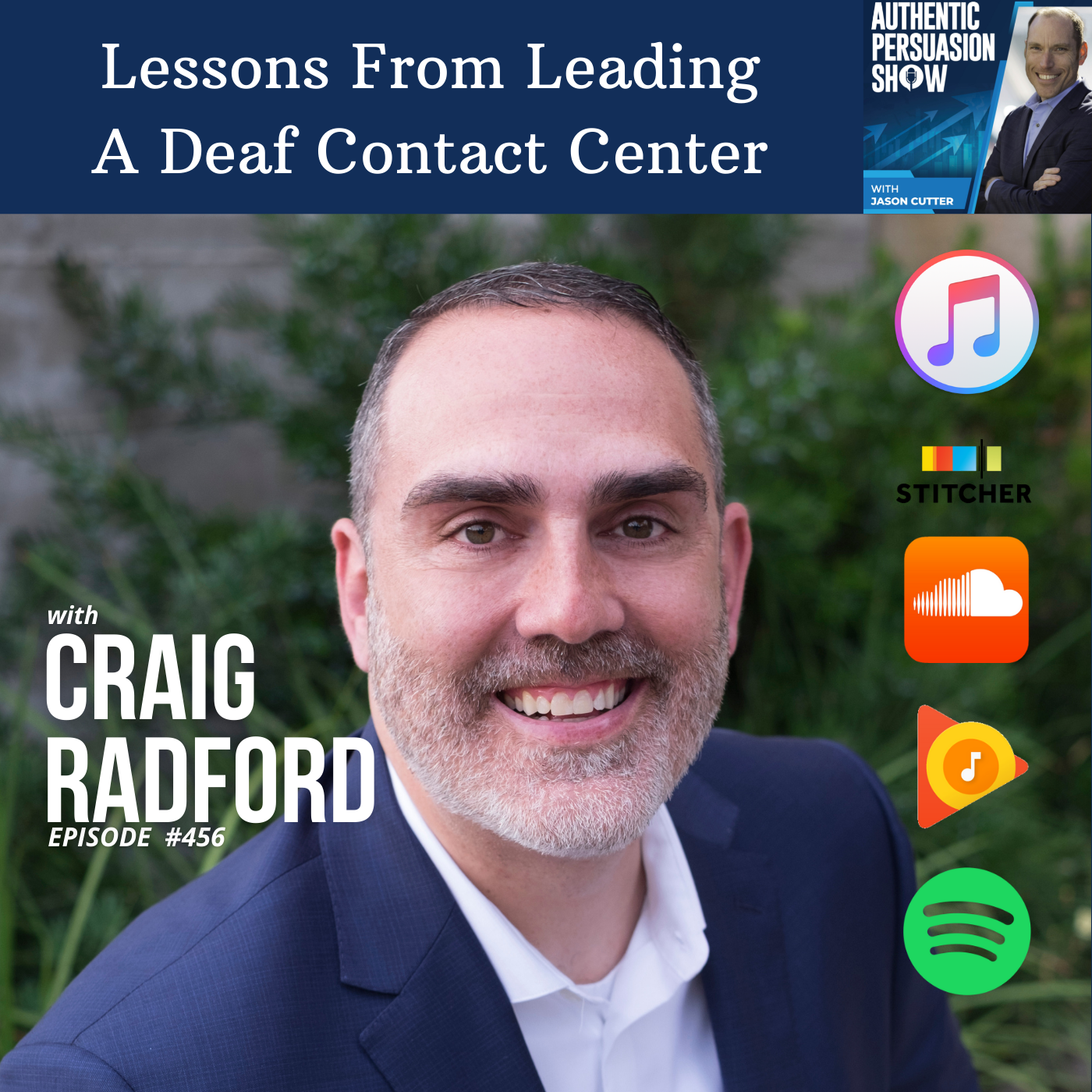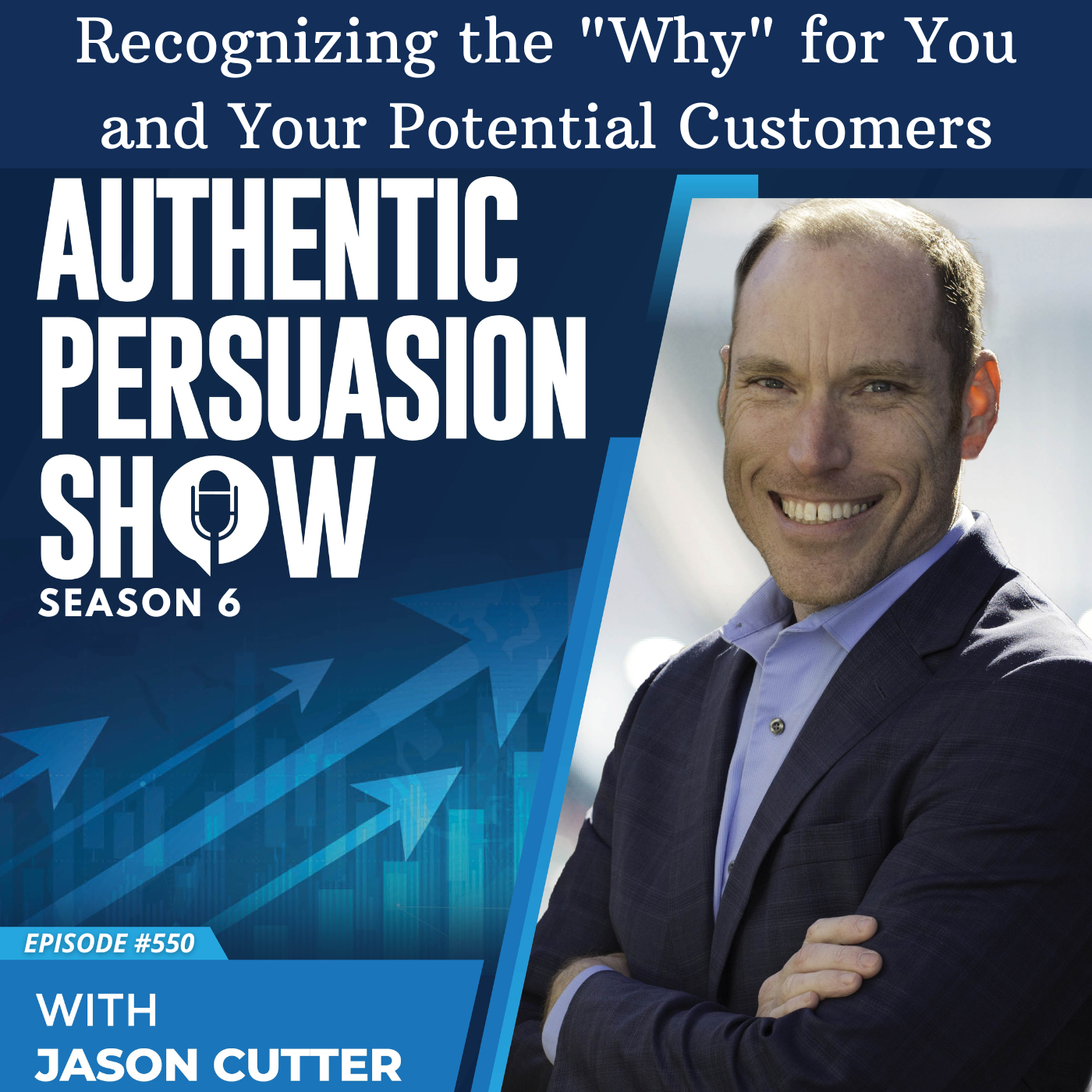Show Notes
My guest for this next 4-part series is Joe Rizzo. I must say that this was a great conversation between two people on the same wavelength of how sales should be done by professionals. And not just because he is an avid listener of this podcast, but because he focuses on doing sales the same way.
In Part 1, Joe and I talk about:
- Not wanting the deal more than the other person
- Are you making the most out of your leads/opportunities?
- Balancing activity level with goals
Download The Power of Authentic Persuasion ebook
Enroll in the Authentic Persuasion Online Course
Connect with Jason on LinkedIn
Connect with Joe on LinkedIn
Joe’s Bio:
He is the founder of The Executive Recruiter Network, an Advisor to Facebook, a LinkedIn Consultant, and with his firm Tash Rizzo – he helps recruiting and staffing companies with their lead generation strategies.
Joe’s Links:
Website – https://tashrizzo.com/ or executiverecruiternetwork.com
E168 – Transcript
Jason: Hey and welcome to the sales experience podcast. My name again is Jason Cutter and on today’s episode I have Joe Rizzo, so he is the founder of the executive recruiter network and advisor to Facebook, LinkedIn consultant and with his firm Tash Rizzo, he helps recruiting and staffing companies with their lead generation strategies. He has done a ton in sales starting a long time ago in insurance and doing so many things and excited to have him on the show. Joe, welcome to the sales experience podcast.
Joe: Awesome. Thank you for having me. I’m excited to be here now.
Jason: We were talking a little bit before we got started on here. You’d been listening to the episodes. You kind of know what’s going on with the show here and kind of what to expect, what we’re going to jump into. And since you ran so many different companies successfully and done so much in your sales career, I thought what might be fun for us to do is start with the questions that I have generally not been great at asking, but I think they’re kind of valuable and will tie in a lot of your experiences. And so let’s talk about the sales experience in your experience, and you can go way back if you want. We can talk about what you’ve learned, but what does a great sales experience look like both from a sales rep and a customer standpoint.
Joe: That’s good. And that’s great. I did my homework so I thought, Hey, I’ll know all the questions that Jason’s gonna ask.
Jason: I throw, I throw some people for a curve ball by literally doing none of that.
Joe: No, that’s great. That’s all I appreciate. Yeah, that’s a good question. So the sale experience, I love the way you put it too. It’s an experience, right? I think the sales experience from the customer side should feel like a good experience. You know, some people say people don’t like to be sold, some people say people do like to be sold, but I think people enjoy an experience when they’re buying something and you know, whether it’s something you were looking for or not looking for, when the sales representative can make that an experience for the person, I think it increases their likelihood of buying when there’s either an emotional tie in or something that makes it experiential versus this just happened to them that they went through an experience and there’s some type of transformation, you know, from where they worked, where they are. So I know for me when I buy things and you know, whether it’s opening up a box, whether the person presenting something, all every little step of the sales experience as a buyer, when I looked at it from my standpoint, it should be something that is moving me closer.
Joe: But also changing the way I feel about the product or service as I’m going through the sales experience is making me more comfortable. That’s making me more excited. And that is changing the way I feel as a sales representative. I believe that the had experience be something that you help them, someone move along and when they’re stuck that you’re actively listening to where they are to help move them along. Because I think sometimes salespeople try to move the person along and experience by skipping a step. Right. And you know, well that’s part of the sales process. Whether it’s part of the rapport, whether it’s part of, you know, building, you know, you talk about this, having some empathy, understanding that person’s situation. If you move them along, you talk about this, I think episode 64 if I did my homework, you know, making sure that that person has a good experience there. You’re not moving them to hope before you understand where they are in, in the process. I think that’s so important to, as a salesperson to sit and really listen to that person where they are before they’re to the next stage. Cause it, no, it’s done too soon. That person would feel wrong. It’s not a good experience for them. And then you’re left going back and trying to get that person over that hump and now you’re, you’ve just created more objections, objectives, things in your way of actually closing the deal. That makes sense.
Jason: It does. And first off, great job on the homework and listening to the episodes, which is awesome. And so true, at least in my experience as well, and I know we’ve talked about this, is that, you know, you’ve got to have a process and you’ve got to have kind of a system, whatever it is, whatever those steps are that work, but you’ve got to do it in order just like everything else. Yeah, and I’ve seen that all the times where a sales reps will, you get nervous or get excited or something will happen or gets thrown off by a question. Totally skip a step and everything is like a stepping stone that’s got to get you to where you need to be.
Joe: Yeah, absolutely. I think from the other side, it’s people, a good salesperson oftentimes to get somebody to buy, but that person may have buyer’s remorse because they didn’t, you know, they skipped that step. But a good salesperson moved them forward anyway, but now you’ve left that person wondering should they have bought it where it’s the person that moves through entire process and experience has a good buyer journey. They feel good about, about where they’re going and what they’re done. There’s always gonna be someone that has a little bit of buyer’s remorse that’s going to happen, but if they’re mood along that journey in the right task, they’re feeling good at the end of their decision. They’re not questioning, gosh, what did I just do? What did I really just pull up my card for that amount?
Jason: Yeah. Well, and I think that’s always a good sign of the ideal sales experience for whatever you’re selling is that somebody walks away, feels good about it when they wake up at two o’clock in the morning in a cold sweat, not if, but when they realized, wait a second, it was for the best. I bought it because I wanted to. I got help and I know that they’re still around if I have questions. But overall it was a good decision. It wasn’t kind of a bamboozled charismatic kind of talking into something and then, you know, it was like, you know, you get home, you’re like, Oh crap, I didn’t really need X, Y and Z and now I’m upset.
Jason: So in your current role, let’s say, how have you built your ideal sales experience? Like how have you structured that for yourself, for your team, and maybe take us through kind of your transition in the past when you first started sales, right? So when you were in insurance and selling that and kind of to now and what you, what you focus on with building that ideal sales experience.
Joe: I remember when I started in insurance and I was like, my goodness, like when I went back and looked, I was like, I was talking about death, right? The insurance is that, you know, life insurance is, it wasn’t a home insurance was either term insurance or permanent insurance. I was selling at the time. And the investment part was the fun part. But you know, talking to someone about something I didn’t want to talk about oftentimes, which is, you know, hard talk, talking about death and then saying, Hey, by the way, Jason, you’re going to give me money that you’re never going to see while you’re alive. The return on your investment while you’re alive, unless you know you have to do it as an insurance, you know, retirement plan. But the reality is we’re saying, you know, give me money and I’m going to talk to you about that.
Joe: And I think what I learned through that was you can’t just sell that product or someone else can come in. You got to understand that person, what their needs are and why would they even buy it. And so I was fortunate enough to go through that. Like I said, somewhat of a painful experience. I didn’t know how to do any marketing at the time. And this was like talking to people and I really got at listening to what it was that they needed or what it was that they wanted. Was their family really important? Why would they buy life insurance? I don’t think you should talk someone into something those convinced against their will are of the same opinion and still so I think you have to, you know, move them. So the sales experience I learned early on was really just listening to someone asking the right questions when I was being trained to call it a fact finder.
Joe: And you kept asking these questions and what I later learned was the questions are everything about selling the questions that you ask or how you develop. I looked at it as, Hey, I need to understand this so I can get the right information to sell them insurance. But really what was to sell the experience. Hey, tell me about this. Tell me what you have saved. Tell me about why don’t you have saving. Why is now an important time for you asking all these questions. All of a sudden, it wasn’t till later though, they will look back and go, gosh, those are questions that I should’ve been able to use better from the sales standpoint. But I was able to do it anyway just because I happened to be a decent listener. Maybe it’s cause I had three older sisters.
Jason: Well and all of those questions, what you learn when you really get into sales and and step back and look at it from a professional aspect is those questions you’re asking about like do you have money in savings? Why don’t you have money in savings? Like what is your goals? What is your plans? Like why aren’t you doing X, Y andZ ? That’s all ammunition for your sales process on the consultative side, which can be used for good and evil, right? Like anything, right? Like a gun can be used for good, for feeding your family or for evil. It’s really about what you’re doing with it. But all of that is just info that helps you then solve that person’s problem.
Joe: Absolutely. And I think you just nailed right there. It’s helping. Like other questions I’m asking designed to make the sale or solve the problem and are both right and it’s okay to have a little bit of both. It’s like if I believe my product can help these recruiters, which I, I’ve seen it do and I know it can do and then it’s up to me to understand what their need is to make sure that my service and product, you know, we productize our service as a to really make sure it’s a good fit. And so I think it’s asking those questions. You can feel like a selling question if I say, do you have money to invest in marketing? Right. But I can flip that question change a little bit and say, you know, what has been your past budget for marketing? But I don’t, I’ve never had one.
Joe: Okay. One you I, that might be an objection. I actually got to get over it. I’ve never had one. Why do you want to have one now? Have you thought about what that budget should be? They might think it’s a smaller amount and I think it is. So I’ve already uncovered, you know what that is. And so what I tried to do now with our team is really make sure we’re asking questions yes. To see if they’re a good fit. But also uncover what is their need. Like why are they considering doing marketing now? What’s changed is just some add that we happen to do just so good that they had to listen to us or was there a need behind it? Has their business change? What’s changed in the last five years about their business? And I know we all know that the internet has changed so much.
Joe: Facebook, Google, LinkedIn has changed the way people do business now. So I can take a look at a business and say, Hey, what’s changed in last five years? But when I ask those questions in the right way, in the right manner, like I said, what is your, you know, tell me about your marketing budget. Do you feel good about it? And asking those questions rather than, you know, just asking, Hey, do you have money to invest with us if this is a good fit right now? That’s a sales question. People feel like, okay, I might, maybe in a month or two you’re going to automatically get that objection. But when you it the right way, that’s what I really have.
Joe: You know, myself, my team focused on, I was like, Hey, let’s understand this where they are, where they’re sitting before I can make sure that they’re ready to move to the next stage is just asking enough questions. So that’s been what I’ve learned. If I went back and as I got more into sales, I started realizing, Oh, the importance of those questions and how they’re asked to make a person feel comfortable. Cause they also want to be understood before the person wants to be sold. They want to make sure that, Hey, you understand me and my current situation, I believe that every business owner, I believe that their situation is unique.
Jason: Yep. Yeah. Every business owner thinks they’re unique. Every salesperson thinks they’re unique or their situation’s unique. Everyone is unique. They think their situation is their own. They think their problems in life are their own.
Jason: You know, whatever everyone’s going through, each prospect thinks their situation is unique. And as you’re talking, I’m just thinking like just a bunch of different things that we want to talk about. You know on that vein right there, it’s, you know, it’s always important to help your prospect or anybody else realize that they’re not alone, which can be a tricky game because everyone wants to feel special but no one wants to feel alone. So if you’re talking to someone, whatever their issue might be, if you can pull that out. I’ve always used like third party stories of other people I’ve helped relative to their situation, right? Whether single mother or you know, married with kids and dealing with this or you know, a single person living at home, whatever it is, it’s, you know, tying it in so they know that they’re not alone. There’s other people in situations like theirs and that it’s safe to move forward and you know, it will be for the best.
Jason: Alright everybody, that’s it for part one of my conversation with Joe Rizzo. I will give you a spoiler alert. As with most of my guests, we have a great conversation so make sure to subscribe so you can catch all four parts of this mini series and a go to cutterconsultinggroup.com. You can find the show notes, the transcript, all of Joe’s links in advance. If you’re so excited, you can’t wait until the final part. You want to reach out with him. You want to get in touch with him and find out more about his business, what he’s doing and everything he’s got going on on LinkedIn. And as always, keep in mind that everything in life is sales and people remember the experience you gave them.
![[E168] Sales Fundamentals with Joe Rizzo – Part 1 of 4](https://episodes.castos.com/salesexperiencepodcast/images/Joe-Rizzo-Cover-Image.png)


